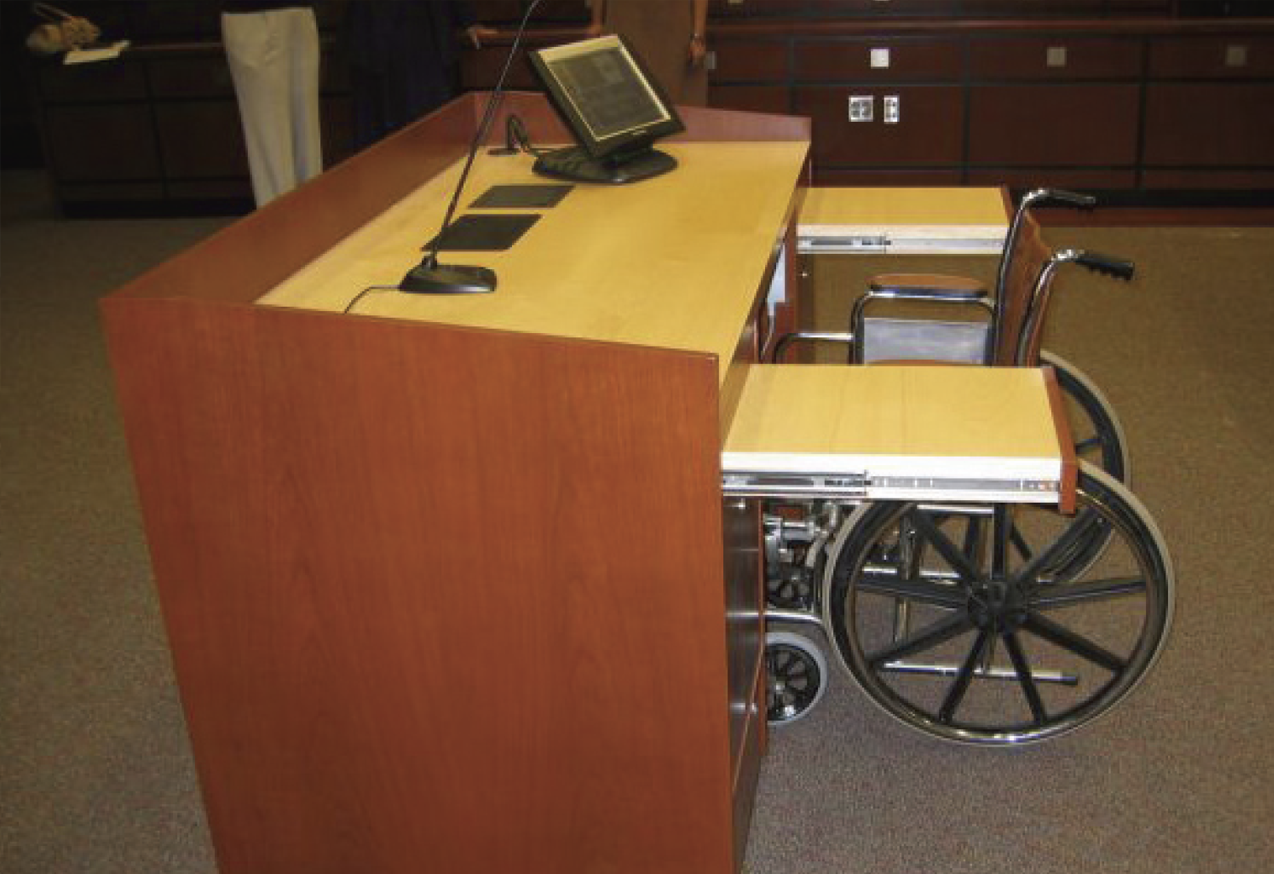What is the ADA?
 The Americans with Disabilities Act (ADA) is a federal law that prohibits discrimination against qualified individuals with disabilities. 42 UCS 12101, et seq. Title II of the ADA applies to the programs, services, and activities of state and local governments, including the judicial branch.
The Americans with Disabilities Act (ADA) is a federal law that prohibits discrimination against qualified individuals with disabilities. 42 UCS 12101, et seq. Title II of the ADA applies to the programs, services, and activities of state and local governments, including the judicial branch.
A person is considered disabled for purposes of the ADA if he or she has a physical or mental impairment that substantially limits a major life activity. “Major life activities” include, but are not limited to: performing manual tasks, seeing, hearing, walking, standing, sitting, speaking, breathing, reading, communicating, and the operation of a major bodily function. 28 CFR 35.108(c)(1)(i, ii). “Substantially limits” is to be construed broadly and is not intended to be a demanding standard. 28 CFR 35.108(d)(1)(i).
Who can request an ADA accomodation?
Any individual with an interest in participating in or attending any proceeding before any court of this state may make a request for ADA accommodations. This includes jurors, parties, attorneys, witnesses, and spectators.
What accommodations are available?
Under the ADA, courts must provide “reasonable accommodations” to enable a qualified person with a disability to fully participate in or benefit from a program or service. There are a wide range of accommodations that the court system may provide, including modifications in practices and procedures, or furnishing auxiliary aids, services, equipment, devices, or materials. The appropriate accommodation depends on the circumstances of each case.
Among the common accommodations are:
- Assistive listening devices, sign language interpreters, or real time computer-aided transcription services (CART) for persons who are deaf or hard of hearing
- Audio recordings, Braille or large- print materials, magnification software, or a reader for persons who are blind or visually impaired
- Assistance with filling out forms for persons who have manual impairments
- Use of a service animal
- Relocation of a proceeding to an accessible courtroom
- Modification of court procedures, such as allowing remote appearances and extensions of time for filing papers
- An accommodation must meet the specific needs of the particular disabled person. Therefore, it is important to be flexible and creative in determining what accommodation is appropriate. Always consult the individual seeking the accommodation, and give first consideration to that person’s preference.
What type of accommodations must be ordered by a judge and what types may be made administratively?
While many accommodations may be arranged by the court’s ADA liaison (see below), or other court employees, certain accommodations can only be ordered by the judge or judicial officer presiding in a case.
Judicial accommodations: Only the judge or judicial officer presiding in a pending case may order an accommodation that would implicate the rights of parties to the proceeding or the judge’s inherent power to manage the courtroom and proceeding. Such “judicial accommodations” may include, for example, extensions of time for the filing of papers, taking frequent breaks during court proceedings, and remote appearances. While only a judge may order such an accommodation, non-judicial court personnel may be called upon to facilitate the accommodation.
Administrative accommodations: In contrast, accommodations that do not affect the rights of parties to the proceeding or the judge’s inherent authority over the courtroom and proceedings may be arranged by non-judicial court personnel. Such “administrative accommodations” include, for example, providing assistive listening devices or scribes, arranging for a court service to be provided in an accessible location, and permitting the entry of a service animal into a courthouse.
What Is The Process For Denying A Request For An Accommodation and How Is A Denial Appealed?
The procedures for obtaining an accommodation, and for appealing the denial of an accommodation, differ for judicial and administrative accommodations.
Judicial accommodations: Accommodations affecting the procedures in a particular case in a manner that may impact the rights of the parties or the exercise of judicial authority can only be granted by the presiding judge. Such requests for judicial accommodation should be made in writing or on the record, and the denial of a request for a judicial accommodation should also be on the record or in written form sufficient to permit appropriate judicial review of the denial. There is no administrative review of the denial of a judicial accommodation. Review of the denial must be sought through the regular process of judicial review.
Administrative accommodations: A request for an administrative accommodation may only be denied by an executive-level manager: in New York City, a Chief Clerk of a court; in the Judicial Districts outside of New York City, a District Executive. The denial must be in writing, on a Denial of Accommodation Form. The denial of an administrative accommodation can be appealed by submitting a Request for Reconsideration Form or other written statement to the Statewide ADA Coordinator within ten (10) days of the written denial. The Statewide Coordinator may extend the filing deadline for good cause, and may permit an alternative means of filing, such as via an audio format, upon request. Additional relevant information or documents may be submitted with the Request for Reconsideration. The Statewide Coordinator will issue a decision in writing, or, as appropriate, in a format accessible to the person requesting reconsideration, within 30 days.

 The Americans with Disabilities Act (ADA) is a federal law that prohibits discrimination against qualified individuals with disabilities. 42 UCS 12101, et seq. Title II of the ADA applies to the programs, services, and activities of state and local governments, including the judicial branch.
The Americans with Disabilities Act (ADA) is a federal law that prohibits discrimination against qualified individuals with disabilities. 42 UCS 12101, et seq. Title II of the ADA applies to the programs, services, and activities of state and local governments, including the judicial branch.